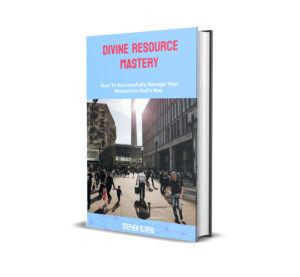
Financial Wisdom
In the bustling city of Metropolis, where the hum of financial transactions never seemed to cease, lived a man named Daniel.
He was known not only for his shrewd business acumen but also for his unwavering financial success, which seemed to defy the ebb and flow of economic tides.
Many sought his advice, wondering what arcane secrets he possessed to navigate the unpredictable waters of the financial world.
As Daniel shared his wisdom, it became evident that his principles were rooted in the timeless teachings of the Bible. The ancient scriptures, often considered a moral and spiritual guide, held profound insights into the art of managing finances.
In this blog post, I will delve into the wealth of financial wisdom concealed within the pages of the Bible, exploring its relevance in the contemporary world.
To strengthen my exploration, I will interlace the narrative with statistics and data, grounding the insights into the reality of today’s financial landscape.
Biblical Foundations of Financial Wisdom
The Bible, a venerable text revered by millions, offers more than just spiritual guidance; it provides a treasure trove of principles for managing finances.
Proverbs, a book nestled within the Old Testament, stands out as a beacon of financial wisdom.
“The plans of the diligent lead surely to abundance, but everyone who is hasty comes only to poverty” (Proverbs 21:5).
This verse encapsulates a fundamental principle – diligence and careful planning pave the path to financial abundance.
Supporting this ancient advice with modern data reinforces its relevance.
According to a survey by the National Endowment for Financial Education, diligent planning and budgeting are key factors in achieving financial success.
The study found that individuals who consistently set financial goals and adhere to budgets are more likely to accumulate wealth over time.
The Art of Saving and Investing
The Bible doesn’t just emphasize earning money but also underscores the importance of saving and investing wisely. Ecclesiastes 11:2 encourages diversification in investments: “Invest in seven ventures, yes, in eight; you do not know what disaster may come upon the land.”
This ancient counsel mirrors the modern financial principle of diversifying one’s investment portfolio to mitigate risk.
Supporting this biblical insight, a report by the World Economic Forum highlights the significance of diversification in investment strategies.
According to the report, diversifying across various asset classes can enhance the potential for stable returns while minimizing exposure to market volatility.
Furthermore, the Bible advocates for the discipline of saving.
Proverbs 21:20 declares, “The wise store up choice food and olive oil, but fools gulp theirs down.”
In contemporary terms, this wisdom translates into cultivating a habit of saving for the future.
Data from the Federal Reserve shows that a significant portion of the population struggles with saving, with many households having little to no emergency savings.
The biblical principle of prudent saving becomes increasingly relevant in a world where financial stability is often threatened by unforeseen circumstances.
The Dangers of Debt and the Virtue of Contentment
One of the recurrent themes in the Bible is the caution against debt.
Proverbs 22:7 states, “The rich rule over the poor, and the borrower is slave to the lender.”
This ancient admonition resonates strongly in the contemporary world, where debt has become a pervasive aspect of financial life.
According to a study by the Federal Reserve, the average household debt in the United States has been steadily increasing, reaching alarming levels.
Analyzing these statistics alongside biblical teachings underscores the timeless wisdom of avoiding excessive debt. The burden of debt not only hampers financial freedom but also introduces stress and anxiety into one’s life. The Bible encourages contentment with what one has, promoting financial peace over the relentless pursuit of material wealth.
Hebrews 13:5 urges, “Keep your lives free from the love of money and be content with what you have because God has said, ‘Never will I leave you; never will I forsake you.'”
Giving and Generosity
Contrary to conventional financial wisdom, the Bible extols the virtues of generosity.
Proverbs 11:24-25 declares, “One person gives freely, yet gains even more; another withholds unduly but comes to poverty.
A generous person will prosper; whoever refreshes others will be refreshed.”
This counterintuitive principle finds support in various studies on the psychology of giving.
Research conducted by the Harvard Business School indicates that individuals who spend money on others report greater happiness and satisfaction than those who spend solely on themselves.
Moreover, the act of giving has been linked to lower stress levels and enhanced well-being.
By integrating such data into the biblical narrative, we find a harmonious convergence of ancient wisdom and contemporary insights on the positive impact of generosity on personal and financial well-being.
Integrity in Business Dealings
The Bible emphasizes the importance of conducting business with integrity.
Proverbs 16:11 asserts, “Honest scales and balances belong to the Lord; all the weights in the bag are of his making.”
This principle aligns with modern ethical standards in business.
A study published in the Journal of Business Ethics found a positive correlation between ethical business practices and long-term financial success.
In a world where corporate scandals and financial misconduct often make headlines, the biblical call for honesty and integrity in business dealings remains a beacon for those navigating the complexities of the modern marketplace.
Integrating these findings with biblical teachings reinforces the enduring relevance of moral and ethical conduct in achieving sustainable financial success.
Conclusion
As I conclude our exploration of the timeless wisdom of the Bible for managing finances, we find that the ancient principles woven into its verses resonate strongly with the challenges and opportunities of the contemporary financial landscape.
I have unveiled the practicality and relevance of biblical teachings on diligence, saving, investing, debt management, generosity, and integrity in business dealings.
The journey of Daniel in the bustling city of Metropolis has not only illuminated the path to financial success but also underscored the enduring value of age-old wisdom. In an era of rapid technological advancements and ever-changing economic landscapes, the Bible stands as a steadfast guide, offering principles that transcend time and cultural shifts. As we navigate the financial seas, let us draw inspiration from the pages of the Bible, where wisdom, both ancient and eternal, awaits those willing to heed its counsel.
You may also want to read
Divine Resource Mastery
 In this unique book, you will :
In this unique book, you will :
- Discover the timeless wisdom of the Bible for managing finances.
- Develop a mindset of responsible stewardship over your resources.
- Learn practical steps for budgeting, saving, and investing.
- Explore how God’s principles can lead to prosperity in all areas of life
Divine Resource Mastery is your comprehensive guide to aligning your financial practices with your faith. Get your copy now and embark on a journey toward financial freedom, spiritual fulfillment, and Godly prosperity.